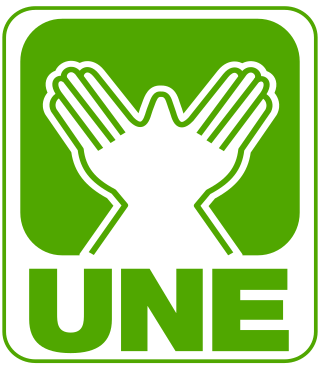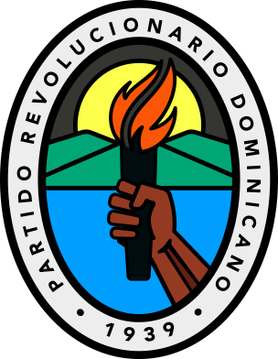
Civic Coalition ARI, until October 2009 known as Support for an Egalitarian Republic, is a centrist political party in Argentina founded in 2002 by Elisa Carrió.

The National Unity of Hope is a populist political party in Guatemala. It was founded in 2002 and defined itself as a social-democratic and social-Christian party, but since transformed and is now described as a right-wing party. It is the largest political party in Guatemala by the number of members.

Union for Peru is a Peruvian political party founded by Javier Pérez de Cuéllar, an ex-UN Secretary General, in 1994 to run for the presidency of Peru in the 1995 general elections. Originally a social democratic party, the party became the main political home of the Peruvian ethnocacerist movement in the late-2010s after a group led by former Army Major Antauro Humala joined the party. Humala later formed the Patriotic Front in 2018 and contested the 2021 general elections.

The Dominican Revolutionary Party is a political party in the Dominican Republic. Traditionally a left-of-centre party and social democratic in nature, the party has shifted since the 2000s toward the political centre. The party's distinctive color is white. Traditionally, the party has two presidents: the "Titular President" and the "Acting President" ; until 2010 the presidents and the Secretary-General were proscribed to run for any elected office.

The Labor Party is a political party in Mexico. It was founded on 8 December 1990. The party is currently led by Alberto Anaya.

The Christian People's Party is a centre-right and conservative political party based on the principles of Christian democracy. It was founded in 1966 by Christian Democratic Party dissidents, led by Luis Bedoya Reyes, at the time mayor of Lima.

The 1986 Spanish general election was held on Sunday, 22 June 1986, to elect the 3rd Cortes Generales of the Kingdom of Spain. All 350 seats in the Congress of Deputies were up for election, as well as 208 of 254 seats in the Senate.

The Christian Democratic Party is a Salvadoran political party. From 2011 to 2012, the party was renamed to Party of Hope before reverting to the Christian Democratic Party. The PDC has been led by Reinaldo Carballo since 2023.
The Unionist Party is a conservative political party in Guatemala, who advocates the re-creation of a Central American union.

The New Alliance Party is a state-level political party in Mexico founded in 2005.

The Peruvian Humanist Party, formerly the is a humanist political party in Peru, and a former member of the Decentralization Coalition together with the Partido por la Democracia Social - Compromiso Perú. The PMHP won the regional elections of 2002 for the northern region of Lambayeque.
The People's Democratic Party is a minor political party in the Dominican Republic. It first contested national elections in 1974, when it provided the main opposition to the ruling Reformist Party due to the Dominican Revolutionary Party not contesting the elections. Its candidate, Luis Homero Lajara Burgos, received 15% of the vote in the presidential election, whilst the party won three seats in the House of Representatives. In 1978 many of the opposition parties returned to the electoral scene. Lajara Burgos received only 0.4% of the vote in the presidential election, whilst the party lost all three seats in the House of Representatives after a similar result in the Congressional elections.
The Christian People's Party is a minor political party in the Dominican Republic. It first contested national elections in 1986, when it was part of the Dominican Revolutionary Party-led alliance which lost to the Social Christian Reformist Party coalition. In the 1990 elections it formed an alliance with MIM, but received only 0.4% of the national vote and failed to win a seat. The party did not contest the 1994 elections, but was again part of a Dominican Revolutionary Party-led alliance in the 1998 elections. However, it switched its allegiance to the Social Christian Reformist Party for the 2002 elections. It had a candidate in the 2004 presidential elections, but they received less than 0.5% of the vote. In the 2006 elections it was part of the defeated Grand National Alliance. The party did not contest the 2010 elections.

The Revolutionary Left Front is a political party in Bolivia, founded in 1978.

Peru Wins was a leftist electoral alliance in Peru formed for the 2011 general election. It was dominated by the Peruvian Nationalist Party and led by successful presidential candidate Ollanta Humala Tasso.

Presidential elections were held in the Dominican Republic on 20 May 2012. They were the fifth quadrennial elections for the presidency and vice-presidency since 1998, when a change in the electoral law separated the presidential from the congressional and municipal elections.
The National Regeneration Movement, commonly referred to by its syllabic abbreviation Morena, is a major left-wing populist political party in Mexico. As of 2023, it is the largest political party in Mexico by number of members; it has been the ruling party since 2018, and won a second term in the 2024 general election.

The 1983 Castilian-Leonese regional election was held on Sunday, 8 May 1983, to elect the 1st Cortes of the autonomous community of Castile and León. All 84 seats in the Cortes were up for election. The election was held simultaneously with regional elections in twelve other autonomous communities and local elections all throughout Spain.

The 1983 Balearic regional election was held on Sunday, 8 May 1983, to elect the 1st Parliament of the autonomous community of the Balearic Islands. All 54 seats in the Parliament were up for election. The election was held simultaneously with regional elections in twelve other autonomous communities and local elections all throughout Spain.

General elections were held in the Dominican Republic on 5 July 2020 to elect a president, vice-president, 32 senators and 190 deputies. They had originally been planned for 17 May, but were postponed due to the coronavirus pandemic. They are the second elections since 1994 in which all positions will be elected simultaneously, and the first in Dominican history in which all authorities will be elected simultaneously and directly.
















